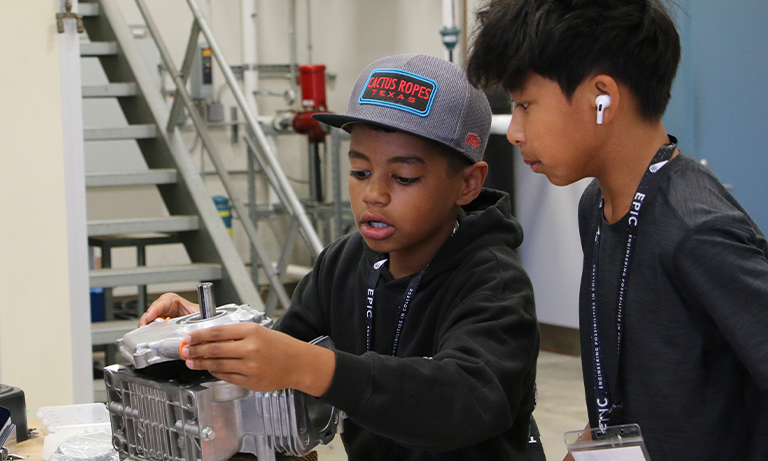An engineering student is reflecting on a summer service trip to South Africa that profoundly altered his worldview, fostering empathy, cultural sensitivity and a renewed drive to make a difference.
“Seeing how other people live in the world gave me a new perspective on my own privilege,” said Max Scott, a third-year mechanical engineering major whose trip was sponsored by the College of Engineering.
Scott joined seven other students for the Alternative Breaks program organized by the Center for Service in Action. The domestic and international trips offered annually give Cal Poly students the opportunity to support their global community while exploring outside their positions of privilege.
Participants this winter signed up to spend their first two weeks of summer break in Cape Town, South Africa, providing humanitarian aid in partnership with Film School Africa – a six-year collaboration that brings together two sets of college students for service.
“We didn’t come in with a mindset of ‘We know better than you’ but came in with a learner’s posture,” he said. “We wanted to learn about the culture and how other people live in the world.”

Serving in South Africa
Prior to departure, the Cal Poly students gathered for training sessions to earn their Global Leadership certificate, discussing issues ranging from the effects of apartheid to the importance of intercultural intelligence.
Majors represented among the group of eight included mechanical engineering, anthropology and geography, environmental science, business and construction management.
“We all had different ethnicities and socioeconomic backgrounds, but we all had so much in common despite seemingly being so different,” said Scott, adding each member had a high value for community service.
After almost 24 hours in the air, the team touched down in South Africa and began their work at the Somerset West Night Shelter – a haven for homeless families.

Students were tasked with painting walls and baseboards, and installing plastic flooring in three outbuildings that would provide temporary homes for the families living in converted classrooms at the shelter. They also created walkways with sandbags to give residents safe passage during the winter months.
“We had a lot of help from the kids at the shelter who were eager to shovel sand and keep us and themselves entertained,” he said. “They were excited to see us and enthusiastic about the work we were doing.”
Cal Poly students collaborated with 15-20 students from Film School Africa – a college-level program that equips students to work in the booming South Africa film industry.
“They brought us into their community and were so welcoming, which was particularly nice considering we were halfway across the world,” Scott said. “It felt like we’d known them for a long time.”

Experiencing South Africa
Alternative Breaks trips immerse students in another culture, giving them the opportunity to examine social issues and learn history from those who have experienced it.
Particularly impactful, said Scott, was a visit to Robben Island where Nelson Mandela, the first democratically elected president of South Africa, spent 18 of his 27 years in prison.
Their tour guide also had been incarcerated on the island and shared his firsthand account about the harsh conditions and hard labor that defined the apartheid-era prison.
“Despite the terrible conditions, the human spirit and determination of the prisoners gave them hope for the future,” he said. “It was empowering.”

On another excursion to the colorful Bo-Kaap neighborhood – home to the Muslim community of Cape Town – the tour guide invited students into his home where his family was cooking curries, rices, roasted vegetables and a fried herb dough dessert.
“It was as delicious as it sounds if not more so,” said Scott who dined with the group in the guide’s backyard. “A highlight of our trip, no doubt.”
Other highlights included a hike up iconic Table Mountain, visits to a cheetah sanctuary and ostrich farm, and day trip to Stellenbosch – South Africa’s second-oldest town known for its restored Cape Dutch architecture.

The trip culminated with a visit to District Six Museum, which pays homage to District Six – a once vibrant community of artisans, freed slaves, merchants, laborers and immigrants. After District Six was declared a white area in 1966, more than 60,000 residents were forcibly removed, and their homes were flattened by bulldozers.
“It was somber to hear stories from our guide who lived through that experience,” he said. “As depressing as it was, I felt it was necessary to expose us to the dark side of history so that we don’t repeat it.”
Scott is spending the rest of his summer working as a lifeguard at his home beach in San Diego. He said he’s returned with a newfound appreciation for all he’s been afforded and is looking for more ways he can give back.
“Seeing another part of the world was eye-opening,” he said. “I can’t help what I was born into, but I can use my privilege for good.”
By Emily Slater



